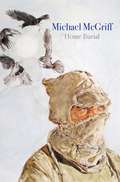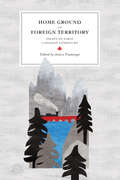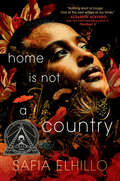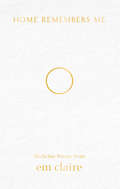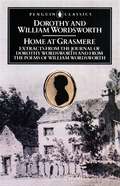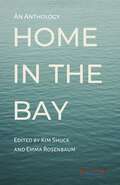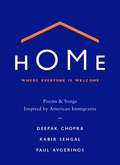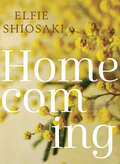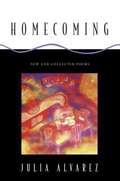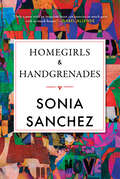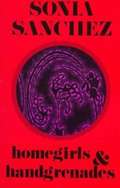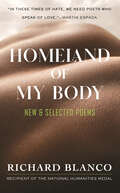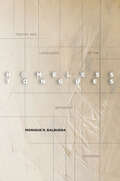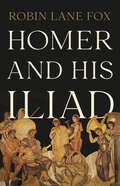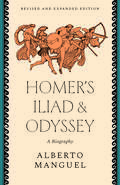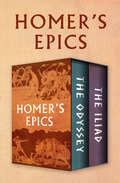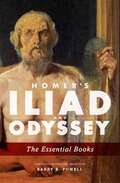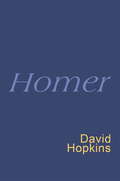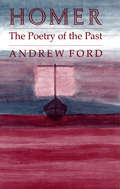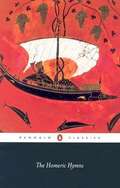- Table View
- List View
Home Burial
by Michael Mcgriff"A lyricist at heart, McGriff is a masterful maker of metaphor."-Third Coast"There is majestic beauty in these descriptions, and it is clear that McGriff honors this place as a place-not as mere setting, but as a distinct element of his verse."-Gently Read LiteratureMichael McGriff's second full-length collection explores interior landscapes and illustrates life in a rural community in the Pacific Northwest. Whether tender or hard-hitting, McGriff juxtaposes natural images of deep forests, creeks, coyotes, and crows against the harsher oil-grease realities of blue-collar life, creating poems that read like folk tales about the people working in grain mills, forests, and factories."New Civilian"The new law says you can abandon your childin an emergency room,no questions asked. The young fathercarries the sleeping boythrough the hospital doors.Later, alone, parked at the boat basin,he takes a knife from his pocket,cuts an unfiltered cigarette in two,lights the longer half in his mouth.He was a medic in the war.In his basement are five bronze eaglesthat once adorned the wallsof a dictator's palace.Michael McGriff attended the University of Oregon; the University of Texas at Austin, where he was a Michener Fellow in creative writing; and Stanford University, where he was a Stegner Fellow. He is the co-founding editor and publisher of Tavern Books and lives in Salt Lake City, Utah.
Home Ground and Foreign Territory: Essays on Early Canadian Literature (Reappraisals: Canadian Writers)
by Janice FiamengoHome Ground and Foreign Territory is an original collection of essays on early Canadian literature in English. Aiming to be both provocative and scholarly, it encompasses a variety of (sometimes opposing) perspectives, subjects, and methods, with the aim of reassessing the field, unearthing neglected texts, and proposing new approaches to canonical authors. Renowned experts in early Canadian literary studies, including D.M.R. Bentley, Mary Jane Edwards, and Carole Gerson, join emerging scholars in a collection distinguished by its clarity of argument and breadth of reference. Together, the essays offer bold and informative contributions to the study of this dynamic literature. Home Ground and Foreign Territory reaches out far beyond the scope of early Canadian literature. Its multi-disciplinary approach innovates literal studies and appeals to literature specialists and general readership alike.
Home Is Not a Country
by Safia ElhilloA mesmerizing novel in verse about family, identity, and finding yourself in the most unexpected places--for fans of The Poet X, I Am Not Your Perfect Mexican Daughter, and Jason Reynolds. <P><P>Nima doesn't feel understood. By her mother, who grew up far away in a different land. By her suburban town, which makes her feel too much like an outsider to fit in and not enough like an outsider to feel like that she belongs somewhere else. At least she has her childhood friend Haitham, with whom she can let her guard down and be herself. Until she doesn't. <P><P>As the ground is pulled out from under her, Nima must grapple with the phantom of a life not chosen, the name her parents didn't give her at birth: Yasmeen. But that other name, that other girl, might just be more real than Nima knows. And more hungry. And the life Nima has, the one she keeps wishing were someone else's. . .she might have to fight for it with a fierceness she never knew she had." <P><P>Nothing short of magic...One of the best writers of our times."-- Elizabeth Acevedo, New York Times Bestselling author of The Poet X
Home Remembers Me: Medicine Poems from Em Claire
by Em ClaireHome Remembers Me: Medicine Poems from em claireis a collection of over ninety, awe-inspiring poems selected specifically for anyone in need of comfort, courage, and most of all: hope. Aimed at facilitating deep healing, the poetry offers companionship in times of crisis, taking us by the hand and, poem by poem, leading us out of the darkness and into the light.Silently read or memorized and used as mantra; written down and carried as a personal talisman; given as a gift, or shared aloud, this poetry has been used as medicine, administered from friend to friend, counselor to client, lover to lover, caregiver to hospice patient, clergy to congregation, and shared in retreats and workshops of all kinds, all over the world.
Home at Grasmere: Extracts from the Journal of Dorothy Wordsworth and from the Poems of William Wordsworth
by Dorothy Wordsworth William WordsworthA continuous text made up of extracts from Dorothy Wordsworth's Journal and a selection of her brother's poems. Dorothy Wordsworth kept her Journal 'because I shall give William pleasure by it'. In doing so, she never dreamt that she was giving future readers not only the chance to enjoy her fresh and sensitive delight in the beauties that surrounded her at Grasmere but also a rare opportunity to observe 'the progress of a poet's mind'. Colette Clark's skilful and perceptive arrangement of Dorothy's entries alongside William's poems throws a unique light on his creative process, and shows how the interdependence of brother and sister was a vital part in the writing of many of his great poems. By reading these poems in relation to the Journal it is possible to trace the processes by which they were committed to paper and so achieve a fuller understanding of them. A writer in her own right, Dorothy kept her Journal sparse in personal and emotional detail. Yet there is, nevertheless, a deep emotional undercurrent running beneath the surface which only falters when William marries Mary Hutchinson. Never again was Dorothy to achieve the freedom, spontaneity and the limpidly beautiful prose with which she infused and irradiated the Grasmere Journals.
Home in the Bay
by Kim ShuckFeaturing works by esteemed writers devorah major, Maw Shein Win, Kim Shuck, tiny gray-garcia, Val Vera, Jan Steckel, Arnoldo Garcia, J Spagnolo, Audrey Can-dyCorn, Lisa Ganser, Muteado Silencio, Dee Allen, and more, this anthology brings together pieces shared and inspired by Aunt Lute Books’ Home in the Bay project honoring voices impacted by gentrification, colonization, migration, and homelessness.
Home: Poems & Songs Inspired by American Immigrants
by Deepak Chopra Kabir Sehgal Paul AvgerinosThe United States is composed of and built by immigrants, and it has been a beacon to those in search of a new life for hundreds of years.HOME is a collection of thirty-four poems and twelve songs inspired by a diverse group of immigrants who have made significant contributions to the United States. From Yo-Yo Ma to Audrey Hepburn, Albert Einstein to Celia Cruz, these poems symbolize the many roads that lead to America, and which we expect will continue to converge to build the highways to our future.This unique collaboration takes the form of a keepsake hardcover book, with a CD of beautiful original music tucked inside. An audiobook edition in which Deepak Chopra reads the poems is also available, as a digital download. This hardcover book (with accompanying music CD) and digital-only audiobook will be available simultaneously in September 2017. Offering a welcoming feeling intended to inform our cultural conversation and enhance our national dialogue, HOME has twelve accompanying musical pieces that serve as personal meditations on the essence of home, in which you can reflect upon where you feel most welcome, whether a place or state of mind.Written and composed by immigrants and first generation Americans, HOME provides a stronger sense of welcome and belonging for everyone.
Homecoming: New and Collected Poems
by Julia AlvarezHomecoming was Alvarez's first published collection of poetry, a work of great subtlety and power in which the young poet returned to her old-world childhood in the Dominican Republic.
Homegirls & Handgrenades
by Sonia SanchezWinner of the American Book AwardA classic of the Black Arts Movement brought back to life in a refreshed edition"A lion in literature's forest. When she writes she roars, and when she sleeps other creatures walk gingerly."— Maya AngelouOriginally published in 1984, this collection of prose, prose poems and lyric verses is as fresh and radical today as it was then. Sonia Sanchez, the premiere poet of the Black Arts Movement, shows the &“razor blades&” in clenched in her teeth in these powerful pieces.
Homegirls and Handgrenades
by Sonia SanchezSonia Sanchez's award-winning collection of poems, which contains some of her seminal work and is a winner of the American Book Award.
Homeland of My Body: New and Selected Poems
by Richard BlancoA rich, accomplished, intensely intimate collection with two full sections of new poems bookending Blanco&’s selections from his five previous volumes"An engineer, poet, Cuban American…his poetry bridges cultures and languages—a mosaic of our past, our present, and our future—reflecting a nation that is hectic, colorful, and still becoming."—President Joe Biden, conferring the National Humanities Medal on Richard Blanco, 2023In this collection of over 100 poems, Richard Blanco has carefully selected poems from his previous books that represent his evolution as a writer grappling with his identity, working to find and define &“home,&” and bookended them with new poems that address those issues from a fresh, more mature perspective, allowing him to approach surrendering the pain and urgency of his past explorations. Pausing at this pivotal moment in mid-career, Blanco reexamines his life-long quest to find his proverbial home and all that it encompasses: love, family, identity and ultimately art itself. In the closing section of the volume, he has come to understand and internalize the idea that &“home&” is not one place, not one thing, and lives both inside him and inside his art. The poems range in form, voice, and setting, showcasing his command of craft, but in essence they are one continuous reflection on the existential question at the core of all of Blanco&’s poetry: how can we find our place in the world. All are characterized by his keen eye, deep sensibility, and polished craft, without pretense. This volume is a gift to Blanco&’s many readers but even more to those who have yet to discover that they can understand, and fall in love with poetry, that a poet can speak to them about his own and their own lives so profoundly, and that this poet, as Barack Obama discovered, can speak for all of us.Richard Blanco has been justly celebrated for his poetic gifts and his command of the many forms poetry can take, from the finely structured to the prose poem formats. His previous volumes have been praised by Patricia Smith, Eileen Myles, Sandra Cisneros, Elizabeth Alexander, and many others. His poems have appeared in The New Yorker, The Atlantic, and dozens of other publications.
Homeless Tongues: Poetry and Languages of the Sephardic Diaspora
by Monique BalbuenaThis book examines a group of multicultural Jewish poets to address the issue of multilingualism within a context of minor languages and literatures, nationalism, and diaspora. It introduces three writers working in minor or threatened languages who challenge the usual consensus of Jewish literature: Algerian Sadia Lévy, Israeli Margalit Matitiahu, and Argentine Juan Gelman. Each of them--Lévy in French and Hebrew, Matitiahu in Hebrew and Ladino, and Gelman in Spanish and Ladino--expresses a hybrid or composite Sephardic identity through a strategic choice of competing languages and intertexts. Monique R. Balbuena's close literary readings of their works, which are mostly unknown in the United States, are strongly grounded in their social and historical context. Her focus on contemporary rather than classic Ladino poetry and her argument for the inclusion of Sephardic production in the canon of Jewish literature make Homeless Tongues a timely and unusual intervention.
Homer
by Johannes Haubold Barbara GraziosiThe sixth book of the Iliad includes some of the most memorable and best-loved episodes in the whole poem: it holds meaning and interest for many different people, not just students of ancient Greek. Book 6 describes how Glaukos and Diomedes, though fighting on opposite sides, recognise an ancient bond of hospitality and exchange gifts on the battlefield. It then follows Hector as he enters the city of Troy and meets the most important people in his life: his mother, Helen and Paris, and finally his wife and baby son. It is above all through the loving and fraught encounter between Hector and Andromache that Homer exposes the horror of war. This edition is suitable for undergraduates at all levels, and students in the upper forms of schools. The Introduction requires no knowledge of Greek and is intended for all readers interested in Homer.
Homer
by Irene J. F. De JongBook XXII recounts the climax of the Iliad: the fatal encounter between the main defender of Troy and the greatest warrior of the Greeks, which results in the death of Hector and Achilles' revenge for the death of his friend Patroclus. At the same time it adumbrates Achilles' own death and the fall of Troy. This edition will help students and scholars better appreciate this key part of the epic poem. The introduction summarises central debates in Homeric scholarship, such as the circumstances of composition and the literary interpretation of an oral poem, and offers synoptic discussions of the structure of the Iliad, the role of the narrator, similes and epithets. There is a separate section on language, which provides a compact list of the most frequent Homeric characteristics. The commentary offers up-to-date linguistic guidance, and elucidates narrative techniques, typical elements and central themes.
Homer and His Iliad
by Robin Lane FoxA &“compelling and impressive&” (Sunday Times) reassessment of the Iliad, uncovering how the poem was written and why it remains enduringly powerful The Iliad is the world&’s greatest epic poem—heroic battle and divine fate set against the Trojan War. Its beauty and profound bleakness are intensely moving, but great questions remain: Where, how, and when was it composed and why does it endure? Robin Lane Fox addresses these questions, drawing on a lifelong love and engagement with the poem. He argues for a place, a date, and a method for its composition—subjects of ongoing controversy—combining the detailed expertise of a historian with a poetic reader&’s sensitivity. Lane Fox considers hallmarks of the poem; its values, implicit and explicit; its characters; its women; its gods; and even its horses. Thousands of readers turn to the Iliad every year. Drawing on fifty years of reading and research, Lane Fox offers us a breathtaking tour of this magnificent text, revealing why the poem has endured for ages.
Homer'S Trojan Theater
by Jenny Strauss ClayMoving away from the verbal and thematic repetitions that have dominated Homeric studies and exploiting the insights of cognitive psychology, this highly innovative and accessible study focuses on the visual poetics of the Iliad as the narrative is envisioned by the poet and rendered visible. It does so through a close analysis of the often-neglected 'Battle Books'. They here emerge as a coherently visualized narrative sequence rather than as a random series of combats, and this approach reveals, for instance, the significance of Sarpedon's attack on the Achaean Wall and Patroclus' path to destruction. In addition, Professor Strauss Clay suggests new ways of approaching ancient narratives: not only with one's ear, but also with one's eyes. She further argues that the loci system of mnemonics, usually attributed to Simonides, is already fully exploited by the Iliad poet to keep track of his cast of characters and to organize his narrative.
Homer's "Iliad" and "Odyssey": A Biography
by Alberto ManguelA worldwide exploration of the history, purpose, and inescapable influence of the Iliad and the Odyssey that will inspire readers to think anew about Homer’s work No one knows whether Homer was a real person, but there is no doubt that the epic poems assembled under his name are foundations of Western literature. The Iliad and the Odyssey—with their tales of the Trojan War, Achilles, Odysseus and Penelope, the Cyclops, the beautiful Helen of Troy, and the petulant gods—have inspired us for over two and a half millennia and influenced writers from Plato to Virgil, Pope to Joyce, and Dante to Margaret Atwood. In this graceful and sweeping book, Alberto Manguel traces the lineage of Homer’s poems. He examines their original purpose, either as allegory or record of history; surveys the challenges the pagan poems presented to the early Christian world; and looks at their reception after the Reformation through the present day. In this revised and expanded edition, Manguel ignites new ways of thinking about these classic works.
Homer's Epics: The Odyssey and The Iliad (Collins Classics Ser.)
by HomerThese two timeless epics by the ancient Greek poet—each translated by a world-renowned author—have captured the Western imagination for millennia. The Iliad: Alexander Pope &“works miracles&” in this beautiful verse translation of Homer&’s epic poem set near the end of the Trojan War. It centers on a quarrel between the invading Greek king Agamemnon and his greatest asset in battle, the warrior Achilles. From this conflict, Homer weaves a tale of warring nations, vengeful gods, and the terrible consequences of prideful rage (The New York Times). The Odyssey: The Trojan War is over and Odysseus, the king of Ithaca, embarks to return home. But he is cursed by the god Poseidon to wander the perilous earth for ten years before reaching his destination. Homer&’s epic adventure of survival by wit and battling mythical creatures is presented here in a stirring prose translation by Samuel Butler.
Homer's Iliad And Odyssey: The Essential Books
by Barry B. PowellRenowned Homer scholar Barry B. Powell has already given the world powerful new translations of the Iliad and the Odyssey. Now his Homer's Iliad and Odyssey: The Essential Books brings together his translations of the most important books and passages from these two great poems in one handy volume. Accessible, poetic, and accurate, Barry Powell's translations are an excellent fit for today's students. With swift, transparent language that rings both ancient and modern, Powell exposes students to all of the rage, pleasure, pathos, cunning, and humor that are Homer's Iliad and Odyssey. Both the translations and the introductions are informed by the best recent scholarship.
Homer: Everyman Poetry
by HomerSelected verse from the Iliad and the Odyssey, edited by David Hopkins.
Homer: Everyman's Poetry
by Homer David HopkinsSelected verse from the Iliad and the Odyssey, edited by David Hopkins.
Homer: The Poetry of the Past
by Andrew FordAndrew Ford here addresses, in a manner both engaging and richly informed, the perennial questions of what poetry is, how it came to be, and what it is for. Focusing on the critical moment in Western literature when the heroic tales of the Greek oral tradition began to be preserved in writing, he examines these questions in the light of Homeric poetry. Through fresh readings of the Iliad and the Odyssey, and referring to other early epics as well, Ford deepens our understanding of what poetry was at a time before written texts, before a developed sense of authorship, and before the existence of institutionalized criticism.Placing what is known about Homer's art in the wider context of Homer's world, Ford traces the effects of the oral tradition upon the development of the epic and addresses such issues as the sources of the poet's inspiration and the generic constraints upon epic composition. After exploring Homer's poetic vocabulary and his fictional and mythical representations of the art of singing, Ford reconstructs an idea of poetry much different from that put forth by previous interpreters. Arguing that Homer grounds his project in religious rather than literary or historical terms, he concludes that archaic poetry claims to give a uniquely transparent and immediate rendering of the past.Homer: The Poetry of the Past will be stimulating and enjoyable reading for anyone interested in the traditions of poetry, as well as for students and scholars in the fields of classics, literary theory and literary history, and intellectual history.
Homeric Hymns
by Nicholas Richardson Jules CashfordThere is a growing awareness about Homeric Hymns--both of their poetic value and also of their significance in the development of archaic Greek religious thought. This translation gives the general reader the opportunity of sharing in the appreciation and enjoyment of their beauty.
Homeric Hymns
by Susan C. ShelmerdineThe Homeric Hymns are a rich source of information for Greek myth, religion, language and culture. But they are more than merely scraps of ancient texts to be mined for material of interest to scholars. Long neglected in favor of the great Homeric epics to which they have been connected by name and tradition since antiquity, these poems also tell stories worth reading in their own right.
